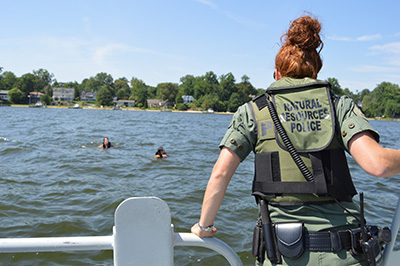
Thousands of visitors and residents flock to Maryland waterways every summer to enjoy a refreshing swim. However, swimming in open water – any expanse of water distant from shore, including bays, rivers, streams, lakes, or the ocean– does present risks.
Swimmers in open water can become fatigued, experience a cramp, and get swept away by a current that can overpower even the strongest swimmer. Unlike in a swimming pool or guarded beach, open water swimmers are usually far from help.
When swimming in open water, you must be mindful of many variables:
- Rapid water temperature changes
- Dangerous currents
- Limited visibility
- Unknown water depth that can only be seen for a couple feet from the surface
- Difficulty judging distances
- Steep drop-offs
- Increased vegetation and rock
- Jellyfish and other aquatic creatures
However, with proper precautions by following these tips, tragedy can be prevented.
Never swim alone and wear a life jacket if necessary
Take a friend if you choose to swim in areas without a lifeguard. Also, ensure they have a cell phone if they need to call 911 for help. However, we encourage swimming when lifeguards are around. People in boats and weaker swimmers should also wear life jackets, especially in open water.
Also, just as in boating, swimmers should have a “float plan” – let someone know where you are going, who is going with you, and when you intend to return. That way if you are not back when you say you will be, they will know to reach out for help.
Know before you go!
Check the weather Always check the weather before you depart, whether going swimming or boating. Sometimes the weather and temperature will change throughout the day. Therefore, keep an eye to the sky and exit the water if inclement weather is present.
Never go in the water while impaired!
If you're consuming alcoholic beverages, stay out of the water and avoid boating. Alcohol and/or drugs (recreational and sometimes prescription) can lead to impaired judgment and slow reaction time. Note that sun exposure also increases the effects of the alcohol and drugs, due to increased dehydration. One drink on the water can be equal to two or three drinks on land.
Reach. Throw. Do Not Go!
If someone is in distress do not jump in to try to save them. Call for help, reach out to them with an elongated item they can grab or throw them something that floats that they can grab on to; life jacket, throwable, cooler, etc.
Adequately preparing yourself and others for your swim and being aware of potential dangers and how to avoid them can increase the safety of swimming in open water.